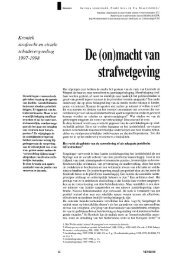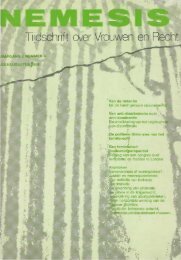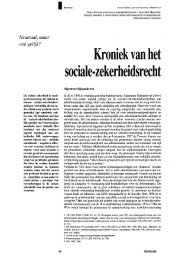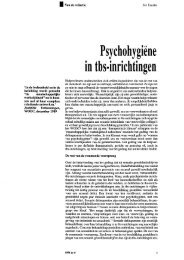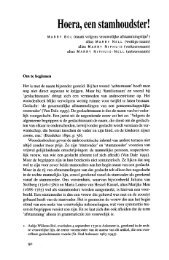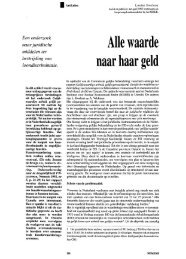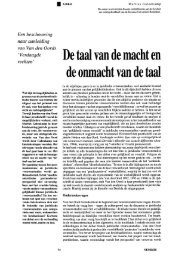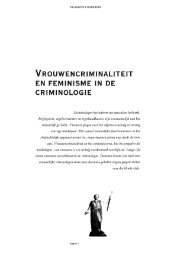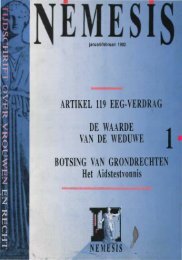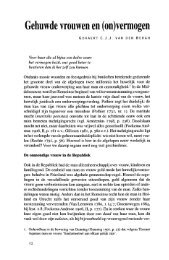(2001) nummer 1 januari/februari - Nemesis
(2001) nummer 1 januari/februari - Nemesis
(2001) nummer 1 januari/februari - Nemesis
You also want an ePaper? Increase the reach of your titles
YUMPU automatically turns print PDFs into web optimized ePapers that Google loves.
Relevant Case Law<br />
I TAKING<br />
In the following cases, the court found that a non-biological<br />
co-parent had no legal rights to the children,<br />
upon the termination of her relationship with the children's<br />
legal mother:<br />
California: Curiale v. Reagan, 272 Cal. Rptr. 520 (3rd<br />
Dist. 1990), Nancy S. v. Michele G., 279 Cal. Rptr. 212<br />
(lst Dist. 1991), West v. Superior Court, 69 Cal. Rptr.<br />
2d 160 (3rd Dist. 1997), In re Guardianship ofZ.C.W.,<br />
84 Cal. Rptr. 2d 48 (lst Dist. 1997);<br />
Florida: Kazmierazak v Query, 736 So. 2d 106 (Fla.<br />
Dist. Ct. App. 1999);<br />
Illinois: In re C.L.B., 723 N.E.2d 316 (lst Dist. 1999);<br />
New York: Alison D. v. Virginia M., 552 N.Y.S.2d 321<br />
(2d Dep't 1990), Lynda A. H. v. Diane T. O., 673<br />
N.Y.S.2d 989 (4th Dep't. 1998);<br />
Ohio: Liston v. Pyles, 1997 WL 467327 (Ohio Ct. App.<br />
lOth Dist. Franklin County 1997); Tennessee: In re<br />
Thompson, 11 S.W.3d 913 (Tenn. Ct. App. 1999);<br />
Texas: Jones. v. Fowler, 969 S.W.2d 429 (Tex. 1998);<br />
and Vermont: Titchenal v. Dexter, 693 A.2d 682 (Vt.<br />
1997).<br />
In the following cases, the court allowed a non-biological<br />
co-parent to have some continued involvement<br />
with the children, upon the termination of her relationship<br />
with the children's legal mother:<br />
Connecticut: Laspina-Williams v. Laspina-Williams,<br />
742 A.2d 840 (Conn. Super. Ct. 1999), holding the coparent<br />
had visitation rights under the state visitation<br />
statute;<br />
Maryland: S.F. v. M.D., 2000 WL 520686 (Md. Ct.<br />
Spec. App. 2000), holding that the co-parent was a defacto<br />
parent and could request visitation; visitation was<br />
refused, however, because of the visitation's negative<br />
impact on the child, Gestl v. Frederick, 2000 WL<br />
870874 (Md. Ct. Spec. App. 2000), holding that Maryland<br />
law allowed the co-parent to show exceptional circumstances<br />
to support her request to custody;<br />
Massachusetts: E.N.O. v. L.M.M., 711 N.E.2d 886<br />
(Mass. 1999), holding that there was no statutory authority<br />
for the co-parents request for visitation; the<br />
court, however, ordered visitation under its equitable<br />
powers, the co-parent acted as a de facto parent and the<br />
parties had a written co-parenting agreement;<br />
Minnesota: LaChapelle v. Mitten, 607 N.W.2d 151<br />
(Minn. Ct. App. 2000), upholding an agreement between<br />
the biological mother and the co-parent to share<br />
legal custody after the couple separated;<br />
Missouri: Matter ofT.L, 1996 WL 393521 (Mo. Cir.<br />
Ct. 2000), holding that, if denying custody to a co-parent<br />
resulted in actual detriment to the child, then the coparent<br />
could obtain custody over the biological mother;<br />
however based on the facts of the case, the court<br />
ordered custody to remain with the mother and granted<br />
only reasonable visitation rights to the co-parent;<br />
New Jersey: V.C. v. M.J.B., 748 A.2d539, 80A.L./?.5th<br />
663 (N.J. 2000), holding that the co-parent was a 'psychological'<br />
parent and could request joint legal custody<br />
under the 'parental' custody statute; joint legal<br />
custody was refused, however, because in the facts of<br />
the case, it would not be in best interests of the children;<br />
New Mexico: 829 P.2d 660 (N.M. Ct. App. 1992),<br />
THE SIDE EXIT IN THE UNITED STATES NANCY G. MAXWELL<br />
holding that the co-parent may have a legally recognizable<br />
right to maintain some type of continuing relationship<br />
with the child and enforced the visitation provisions<br />
of the parties' settlement agreement;<br />
Pennsylvania: T.B. v. L.R.M. 2000 WL 714409 (Pa.<br />
Super. Ct. 2000), holding that the co-parent had standing<br />
to request visitation with the child and the case was<br />
remanded to the trial court to take more evidence on<br />
whether granting visitation was in the child's best interests;<br />
Wisconsin: In re Custody of H.S.H.-K., 533 N.W.2d<br />
419 (Wis. 1995), overruling In re Interest of S.J.H.,<br />
All N.W.2d 202 (Wis. 1991) holding that the court has<br />
equitable powers to award visitation to a co-parent and<br />
enforced the parties' written co-parenting agreement.<br />
In addition, in May 2000, the American Law Institute<br />
(ALI) adopted ' Principles Governing the Allocation of<br />
Custodial and Decisionmaking Responsibility for<br />
Children'. The American Law Institute is an advisory<br />
organization, similar to the National Conference of<br />
Commissioner on Uniform State Laws (see supra, text<br />
at footnotes 9-10), that addresses certain areas of the<br />
law in an attempt to unify legal principles among<br />
the states. The ALI Principles Governing the Allocation<br />
of Custodial and Decisionmaking Responsibility<br />
for Children recognize three groups of individuals<br />
who may have substantive and procedural rights involving<br />
claims of custody/residential rights. These<br />
three categories are: legal parent, parent by estoppel,<br />
and de facto parent. Consequently, under these Principles,<br />
non-biological co-parents may have rights to custody/residency<br />
or visitation/access if they meet the<br />
criteria set out in the last two categories-parent by<br />
estoppel or de facto parent. To complicate matters,<br />
however, in June 2000 a plurality decision of the U.S.<br />
Supreme Court found a grandparent visitation statute<br />
was unconstitutional when applied to a situation involving<br />
a disagreement between a legal parent and the<br />
grandparents concerning the amount of time the grandparents<br />
could visit the children. The Supreme Court<br />
held that a court-order under this statute, granting the<br />
grandparents more visitation time over the objection of<br />
the legal parent, violated the due process clause of the<br />
U.S. Constitution because it infringed on fundamental<br />
parental rights. Troxel v. Granville, -U.S.-, 120 S. Ct.<br />
2054, 147 L. Ed. 2d 49, 68 USLW 4458, 2000. This<br />
case may be used by biological mothers to prevent the<br />
co-parents from obtaining any rights of access to the<br />
children once the relationship ends.<br />
22 NEMESIS <strong>2001</strong> nr. 1



